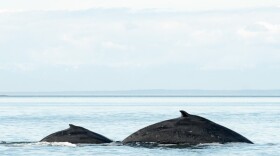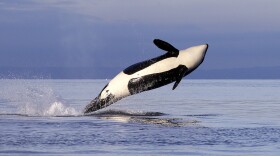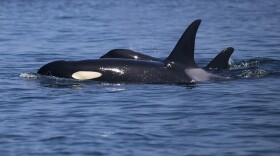-
(Runtime 1:06)Giant ships that transport everything from coffee cups to clothes across the ocean are often so large they can’t tell when they collide with…
-
The federal government has commissioned Oregon State University to look into the possible impacts of offshore wind farms on marine wildlife. In the first year of this four-year project, the researchers spotted sizable numbers of seabirds and whales — including the largest animal on Earth — in the Oregon and Northern California areas that could one day host floating wind farms.
-
Fortunately, it doesn't happen very often in the Pacific Northwest that ships collide with whales. But when it does, it's upsetting, tragic and the whale probably dies. Three separate teams have developed smartphone-based systems that can alert commercial mariners to watch out, slow down or change course when whales have been sighted nearby. A recent ride-along on a big container ship demonstrated that real-time whale alerts are still a work in progress.
-
Scientists aboard the Bell M. Shimada keep an eye out for whales. One scientist hopes to help predict where whales will show up by studying the food they eat.
-
Whale watchers have spotted a record number of humpback calves in inland Pacific Northwest waters this season. There was also a record streak of Bigg's killer whale sightings that just ended, according to a local whale research nonprofit. Those observations offer some good news to offset the ongoing concern about the survival of the Northwest's iconic, but critically endangered resident orcas.
-
If you take a beach walk in springtime around Whidbey or Camano Island, north of Seattle, there's a good chance you could spot a 40-foot-long gray whale, feeding in the shallows just offshore. Or you might just see a fin or part of one's tail bobbing along the waterline.
-
According to the rules approved by the commission last week, from July through September, commercial whale watching companies can view endangered Southern Resident orcas during two, two-hour periods daily, The Skagit Valley Herald reported.
-
Last year, a couple who lives near Port Townsend, Washington, agreed to let the federal government drop off a dead gray whale to decompose on their semi-isolated beach. Now, the couple has a permit to keep the whale skeleton and will soon assemble the most amazing yard art.
-
The tribe’s plans have been tied up in legal fights and layers of scientific review. The next step is a week-long administrative hearing that began Thursday in Seattle. Whatever the result, it’s likely to be stuck in further court challenges, as animal rights activists have vowed to block the practice they call unnecessary and barbaric.
-
Whale watch tour companies have knocked a proposed orca protection initiative off the November ballot in San Juan County, Washington. The ballot measure would have asked voters to greatly increase the stand-off distance between boats and endangered killer whales.
Play Live Radio
Next Up:
0:00
0:00
Available On Air Stations










